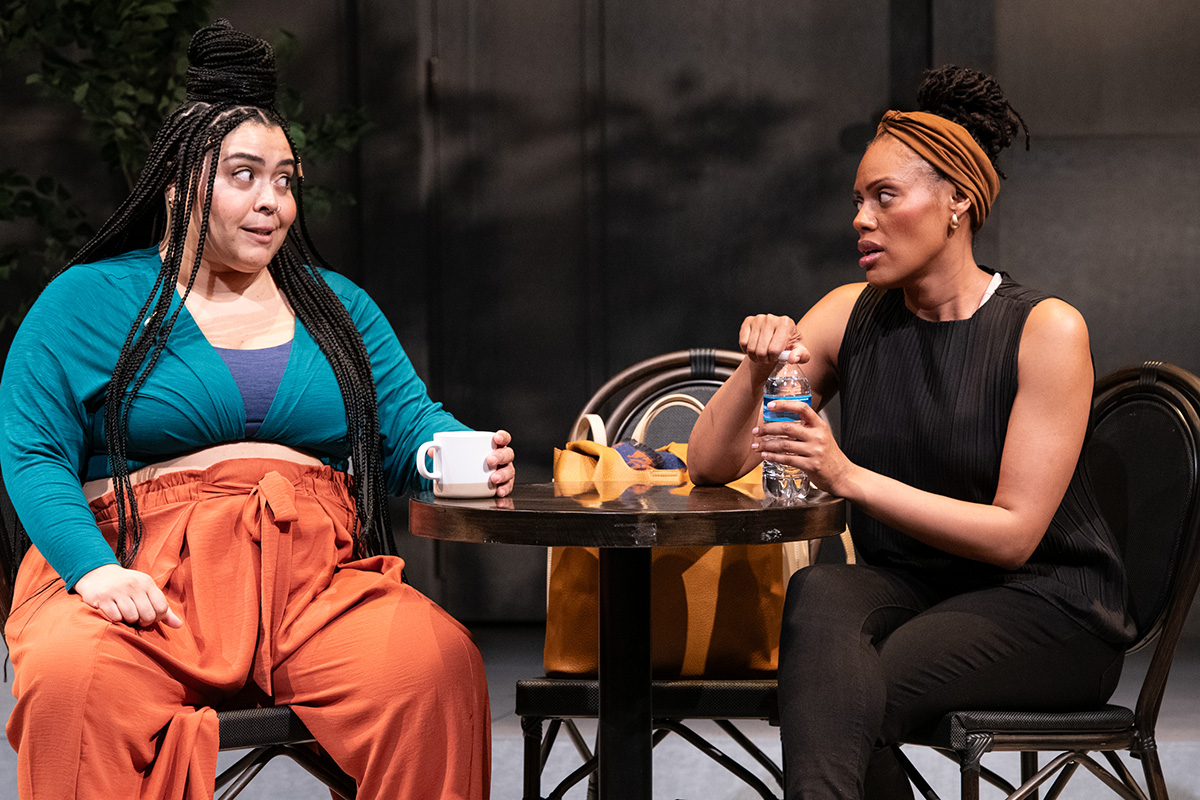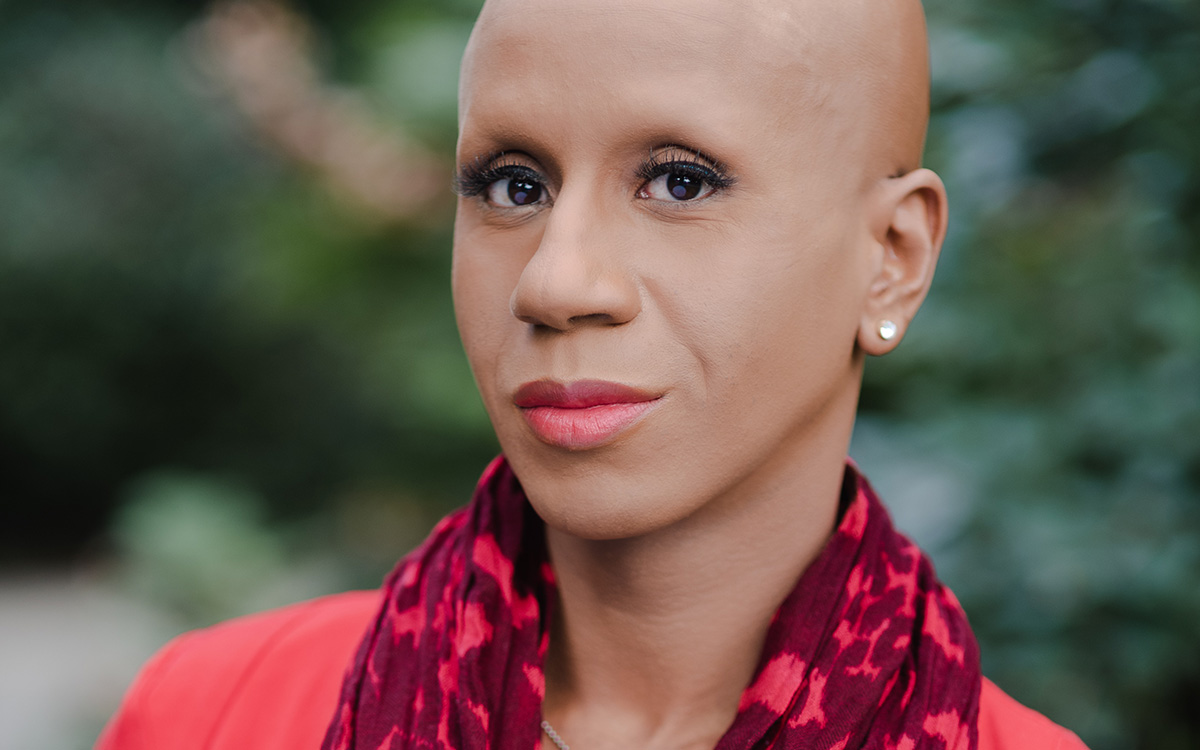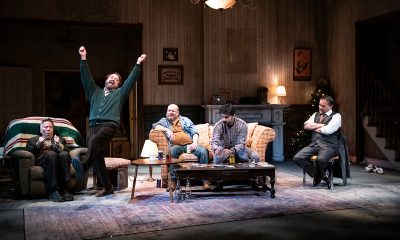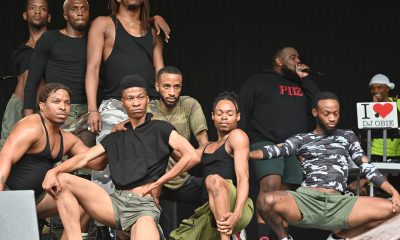Theater
Round House explores serious issues related to privilege
‘A Jumping-Off Point’ is absorbing, timely, and funny

‘A Jumping-Off Point’
Through May 5
Round House Theatre
4545 East-West Highway, Bethesda, Md.
$46-$83
Roundhousetheatre.org
In Inda Craig-Galván’s new play “A Jumping-Off Point,” protagonist Leslie Wallace, a rising Black dramatist, believes strongly in writing about what you know. Clearly, Craig-Galván, a real-life successful Black playwright and television writer, adheres to the same maxim. Whether further details from the play are drawn from her life, is up for speculation.
Absorbing, timely, and often funny, the current Round House Theatre offering explores some serious issues surrounding privilege and who gets to write about what. Nimbly staged and acted by a pitch perfect cast, the play moves swiftly across what feels like familiar territory without being the least bit predictable.
After a tense wait, Leslie (Nikkole Salter) learns she’s been hired to be showrunner and head writer for a new HBO MAX prestige series. What ought to be a heady time for the ambitious young woman quickly goes sour when a white man bearing accusations shows up at her door.
The uninvited visitor is Andrew (Danny Gavigan), a fellow student from Leslie’s graduate playwriting program. The pair were never friends. In fact, he pressed all of her buttons without even trying. She views him as a lazy, advantaged guy destined to fail up, and finds his choosing to dramatize the African American Mississippi Delta experience especially annoying.
Since grad school, Leslie has had a play successfully produced in New York and now she’s on the cusp of making it big in Los Angeles while Andrew is bagging groceries at Ralph’s. (In fact, we’ll discover that he’s a held a series of wide-ranging temporary jobs, picking up a lot of information from each, a habit that will serve him later on, but I digress.)
Their conversation is awkward as Andrew’s demeanor shifts back and forth from stiltedly polite to borderline threatening. Eventually, he makes his point: Andrew claims that Leslie’s current success is entirely built on her having plagiarized his script.
This increasingly uncomfortable set-to is interrupted by Leslie’s wisecracking best friend and roommate Miriam who has a knack for making things worse before making them better. Deliciously played by Cristina Pitter (whose program bio describes them as “a queer multi-spirit Afro-indigenous artist, abolitionist, and alchemist”), Miriam is the perfect third character in Craig-Galván’s deftly balanced three-hander.
Cast members’ performances are layered. Salter’s Leslie is all charm, practicality, and controlled ambition, and Gavigan’s Andrew is an organic amalgam of vulnerable, goofy, and menacing. He’s terrific.
The 90-minute dramedy isn’t without some improbable narrative turns, but fortunately they lead to some interesting places where provoking questions are representation, entitlement, what constitutes plagiarism, etc. It’s all discussion-worthy topics, here pleasingly tempered with humor.
New York-based director Jade King Carroll skillfully helms the production. Scenes transition smoothly in large part due to a top-notch design team. Scenic designer Meghan Raham’s revolving set seamlessly goes from Leslie’s attractive apartment to smart cafes to an HBO writers’ room with the requisite long table and essential white board. Adding to the graceful storytelling are sound and lighting design by Michael Keck and Amith Chandrashaker, respectively.
The passage of time and circumstances are perceptively reflected in costume designer Moyenda Kulemeka’s sartorial choices: heels rise higher, baseball caps are doffed and jackets donned.
“A Jumping-Off Point” is the centerpiece of the third National Capital New Play Festival, an annual event celebrating new work by some of the country’s leading playwrights and newer voices.
Theater
‘Evita’s Return’ offers different take on Argentinian icon
Posthumous look at mummified first lady’s travels is not fiction

“Momea en el Clóset (Mummy in the Closet): Evita’s Return”
Through June 9
GALA Hispanic Theatre
3333 14th St., N.W.
$50
Galatheatre.org
Whether alive or dead, Eva Perón wielded her own brand of political power. After her death in 1952, Eva’s cult of mostly poor and working-class followers remained devoted to their Santa Evita. Her husband, Argentina’s president Juan Perón, fostered adulation by having her wasted body painstakingly embalmed, and displaying the waxen corpse like the incorruptible bodies of sainted Roman Catholic luminaries. But when the anti-Peronistas took power, they had other ideas; storing her away far from sight seemed a better idea.
Typically works about Argentina’s first lady focus on her unbridled ambition and ascent from anonymity to fame, but the strikingly original “Momea en el Clóset (Mummy in the Closet): Evita’s Return” — now at GALA Hispanic Theatre — is different. The collaboration of GALA’s producing artistic director Gustavo Ott (book and lyrics) and Mariano Vales (music and lyrics) spotlights the events following Eva’s death from cervical cancer at just 33.
At the center of this entertaining madness is winning out actor Fran Tapia as Eva, a corpse sporting a ball gown and the trademark platinum blonde chignon, standing stiffly in a closet, more a mobile cabinet actually. In death, she realizes a silent dignity with flashes of an unyielding passion for social justice.
The Chilean award-winning Tapia possesses a stunningly emotive voice, quickly evidenced in the show’s first number “Evita, Evita,” when near death Eva bravely addresses the needy crowd whom she endearingly calls her descamisados (the very poor). Simultaneously, the smug anti-Peronists — bourgeoisie and military types — sing “cancer is homeland,” “cancer is love.” They relish the idea of her dying and are counting the minutes to her imminent demise.
So, the scene is set. Eva’s shabby posthumous story unfolds – performed in Spanish with eloquent English surtitles. Sprinkled with humor and poignant bits, it’s a dramedy, reflective of then and today.
Unlike Eva’s “Rainbow Tour” of 1947 when Argentina’s newly minted first lady was introduced to Europe with mixed results, her death journey is an obscure low-rent, outing. She finds herself in a Milanese cemetery with some particularly pesky souls, each who apparently strode the earth in different centuries (all cleverly costumed by Becca Janney).
For a time, she lands with an increasingly cynical Perón (stentorian-voiced Martín Ruiz) in Spanish exile. With him are new wife Isabel (Camila Taleisnik), portrayed as a reluctant and inept replacement for Evita, and scheming political cum spiritual adviser López (Diego Mariani).
As crazy as it sounds, GALA’s current offering isn’t a work of fiction. At the top of the show, it’s made perfectly clear that any resemblance to the truth is factual. Director Mariano Caligaris’ inventive, fearless staging along with Valeria Cossnu’s exhilarating choreography, make for exciting storytelling.
Music inspired by Latin rhythms of samba, reggae, bachata, tango, tarantella, and waltz (by way of Bavaria) is directed by Walter “Bobby” McCoy and performed live by a fabulous unseen seven-person orchestra.
Grisele Gonzalez’s serviceable, multi-tiered set design affords the various prerequisite balconies and perches. An upstage scrim is perfect for the projections (Hailey Laroe) of grimy actual footage from Eva’s funeral and subsequent violent skirmishes involving fascists against the people.
The cast is uniformly terrific. They sing, dance, and act with equal skill, and whether playing protesters, clerical staff, or handsome Argentinian soldiers, they look the part. Most are required to interact with the cadaver in differing ways from timidly to less than respectfully.
Making his GALA debut, wonderfully able Rodrigo Pedreira shows off his versatility as Dr. Ara, the man tasked with making the dead woman presentable for public consumption, as well as a general whose butch exterior is belied by the occasional mincing walk and longing looks directed at his cute aide-de-camp (Luis Obed Velázquez).
As she travels, mummified Eva says “And once again the moving begins. They move me through offices, basements, garages. They cover me, package me, label me, and off I go traveling again! We come from fascism and toward fascism we go.”
Alive or dead, Eva was never able to successfully crack Buenos Aires’ famously tough high society, but she found fans elsewhere.
Over about 14 years as a displaced dead body and beyond, Tapia’s Eva embodies the spirit of Argentina’s millions, the common people. They return the dedication: Candles are lit. Prayers are offered. Intercession is sought. Life goes on, but Eva isn’t easily forgotten.
Theater
Celebrating the 2024 Helen Hayes Awards nominees
38th annual event returns next week ‘building on last year’s success’

2024 Helen Hayes Award
May 20, 2024
For tickets go to theatrewashington.org
It’s that time of year again when the DMV’s theater pros and those who love them getdolled up and show up to celebrate the best of last year’s work.
On Monday (May 20), Theatre Washington’s Helen Hayes Awards marks its 38th year with a splashy ceremony at The Anthem on the District Wharf. With two parts, a non-rushed intermission, and a lively after party, the program is long but the format allows time to celebrate award recipients, enjoy the entertainment, and talk about some serious issues without racing to the end.
Co-directed by Will Gartshore and Raymond O. Caldwell, the show features four terrific hosts — out actor Tom Story, Felicia Curry, Maria Rizzo, and Rayanne Gonzales along with an ensemble of five singer/dancers (dubbed the Fab Five) peppering the show with some fun numbers.
“We’re building on last year’s success,” says Amy Austin, Theatre Washington’s out president and CEO. “Again, dinner will be served during the show à la Golden Globes on the first floor for mostly nominees and their guests, and the second floor offers lots more affordable stadium seating.”
Austin’s approach harks back to the sumptuous Helen Hayes Awards of yesteryear, which she cleverly remembers as the “ice sculpture age.” Ultimately, the goal is to create something fun, memorable, and meaningful: “It’s such a collaborative community and that’s why the Helen Hayes Awards are special; it’s a reunion of people who’ve worked together.”
Still, the doling out of awards remains the focus of the long evening. And that leaves a lot of nominees waiting on tenterhooks to see just who will go home with prizes named for the legendary first lady of American theater, Miss Helen Hayes.
The awards selection process is no simple task, she adds. Recognizing work from 151 eligible productions presented in the 2023 calendar year, nominations were made in 41 categories and grouped in “Helen” or “Hayes” cohorts, depending on the number of Equity members involved in the production with Hayes counting more.
The nods are the result of 49 carefully vetted judges considering 2005 individual pieces of work, such as design, direction, choreography, performances, and more. Productions under consideration in 2023 included 44 musicals, 107 plays, and 36 world premieres.
As one of this year’s nominees, out actor Justin Weaks says he isn’t about beating the competition. He concedes it may sound cliché, but it’s a privilege simply to be nominated, especially with all the work done in the DMV. And certainly, with three wins and multiple nominations under his belt, he’s in a position to know.
And now, he’s nominated for Outstanding Supporting Performer in a Play, for his notable turn as Belize/Mr. Lies in Arena Stage’s production of Tony Kushner’s seminal masterwork “Angels in America, Part One: Millennium Approaches.”
For Weaks, a longtime D.C. actor who relocated to New York in 2021, the “Angels” experience was singular: “It’s one of those great, very American plays that remains relevant, and that it’s centered on the gay experience and HIV/ AIDS makes it especially impactful for the queer community.”
Often noted for creating roles in new plays, Weaks enjoyed being part of a piece that so many hands have touched since its premiere more than 30 years ago. He was thrilled to work with the production’s Hungarian director János Szász who, Weak says, approached the piece as a new work, treating it like fresh text.
And does Weaks have a speech prepared?
“The morning of the awards, I’ll journal about my experience with ‘Angels,’ and if my name is called, I’ll get up and give an abbreviated version of what I wrote. But mostly for me, it’s a reunion, a chance to be cute, get dressed up and celebrate the work.”
In the Outstanding Lighting Design category, Brooklyn-based Venus Gulbranson is nominated for Woolly Mammoth Theatre Company & The Wilma Theater’s “My Mama and the Full-scale Invasion”. It’s the proud and out Filipino designer’s second nomination (last year she received a nod for Monumental Theatre’s “tick, tick… BOOM!”).
“Lighting design is underrated in the eye of theatergoers,” explains Gulbranson who earned her lighting stripes as an Arena Stage fellow. “Scenic and costume design are somehow more tangible to them; they don’t often realize that it’s lighting designers who navigate the mood of the story.
“It’s a very empathetic skill, and a good designer can take you there emotionally. When you’re tearing up watching a scene, the lighting has a lot to do with it. We also spend a lot of time making scenes transition smoothly,” she adds.
“We half-jokingly say ‘a compliment to set design is a compliment to us.’ We are the reason there are beautiful colors on stage. Scenery is our canvas.”
Other queer nominees include Bobby Smith (Studio Theatre’s “Fun House”), Billie Krishawn (Arena’s “Angels in America”), Miss Kitty (Spooky Action Theatre’s “Agreste”), Michael Urie (The Kennedy Center’s “Monty Python’s Spamalot”), costume designer Frank Labovitz (Constellation Theatre Company’s “The School for Lies”), director Jason Loewith and set designer Tony Cisek (Round House Theatre & Olney Theatre Center’s “Ink”), and most likely more.
Both the Helen Hayes Awards’ choreographer and a nominee, David Singleton is up for Outstanding Choreography in a Musical for NextStop Theatre Company’s “Ride the Cyclone,” a wildly entertaining dark comedy.
“The show’s score is eclectic, so I could do a little bit of everything. I had to find anchor points for each number where I draw most inspiration, and go with it. I have a strong jazz background, both street and musical theater jazz, but I’m also really into tap and some ballet.”
Singleton began performing professionally in “Dreamgirls” at Toby’s Dinner Theatre in 2017, but he hit his stride with “really fierce” choreography post pandemic.
A dancer first, Singleton says his energies are divided into thirds: performer, choreographer, and drag queen (Tiara Missou, an “incredibly vain but kind queen” who’s regularly featured at D.C. bars Pitchers and Shakers). When Singleton was 18, he volunteered to work the Helen Hayes Awards. He recalls thinking “I’ll be part of this one day, for what exactly I’m not sure” and now he says, “I’m here and I feel honored.”
And what about a prepared speech? “Oh, definitely. I’m a rambler.”
Break legs nominees!
A full list of award recipients will be available at theatrewashington.org on Tuesday, May 21.
Theater
Miss Kitty tackles classical mythology in ‘Metamorphoses’
Folger production seen through the lens of the African diaspora

‘Metamorphoses’
May 7-June 16
Folger Theatre
201 East Capitol St., S.E.
$20-$84
Folger.edu
Miss Kitty’s words are thoughtful and measured, occasionally punctuated by flamboyant flourishes and uplifting proclamations. Her tried and tested tagline is “live in fierce not fear.”
She describes herself as “AMAB (assigned male at birth), nonbinary, genderqueer, transfemme” as well as “chanteuse, noble blacktress, and dancer.”
Currently, Miss Kitty is testing her talents in Mary Zimmerman’s “Metamorphoses” at Folger Theatre on Capitol Hill.
At 90 minutes, “Metamorphoses,” is made up of interwoven vignettes from classical mythology including the tales of Midas and his daughter, Alcyone and Ceyx, and Eros and Psyche.
“It’s all stories that relate to the human condition: the follies, the happiness, the love, the loss,” Miss Kitty explains. “And a thorough knowledge of mythology isn’t a requirement for enjoyment.”
The language is contemporary and with its 11-person ensemble cast – comprised exclusively of Black or indigenous people of color – they’re adding their own spin to its present-day feel, she adds.
In Zimmerman’s famously staged premiere production, the actors performed in and around a pool of water. At Folger, director Psalmayene 24 has ditched actual aquatics; instead, he suggests the element by introducing Water Nymph, a new character constructed around Miss Kitty.
Water Nymph doesn’t speak, but she’s very visible from the opening number and throughout the play on stage and popping up in unexpected places around the venue.
“It’s a lot of dancing; I haven’t danced the way Tony Thomas is choreographing me in a very long time. At 40, can she still make theater with just my body as her instrument?
The name “Miss Kitty” was born over a decade ago.
Miss Kitty recalls, “She was still presenting as male and going by her dead name. Someone commented that with the wig she was wearing for a part, she looked like Eartha Kitt whom she deeply admires.”
Her penchant for illeism (referring to oneself in third person) isn’t without good reason. She explains, “It’s to reiterate that however she might look, she’s always there; and if you misgender, she will let you know.”
Initially, the moniker was a drag persona at Capital Pride or the occasional fabulous cabaret performance at a nightclub.
But as time passed, she realized that Miss Kitty was something she couldn’t take off. She had always been a part of her.
“She’s helped me to grow and flourish; she’s given me the strength that I never would have had before. I’m so proud of myself for realizing that before it was too late.”
Bringing Miss Kitty into her theatrical career presented some concerns. Would theater folks be open to the new her, especially those she’d worked with before?
Not always, but she’s found new companies who’ve welcomed Miss Kitty with open arms including Avant Bard, Spooky Action Theater, and now Folger.
Last fall, Miss Kitty appeared in Spooky Action’s Agreste (Drylands), a stunning queer story penned by gay Brazilian playwright Newton Moreno.
After being invited to audition and reading the script, Miss Kitty was determined to be a part of the production.
A work dealing with love and being trans, and transphobia, and how people can turn on a dime once they learn the truth about someone, resonated deeply with the actor.
“The play speaks to the idea that if people just let people be who they are and love who they want to love we’d all be a lot happier,” she says.
For her sublime efforts, Miss Kitty nabbed a Helen Hayes Award nomination in the Outstanding Lead Performer category (winner to be determined on Monday, May 20 during a ceremony at The Anthem).
It’s her first time nominated and first time attending. She’s thrilled.
Miss Kitty grew up in Oxen Hill, Md., and now lives near Washington Harbor. Her entry into performance was through music followed by high school plays. She graduated from Catholic University with a degree in music/concentration in musical theater, and from there dove directly into showbiz.
Looking back, Miss Kitty says, “being a person of color AND queer can be a double whammy of difficulty. You have to live in light and do the things you’re afraid to do. That’s the game changer.”
Presenting “Metamorphoses” through the lens of the African diaspora (the cast also includes Jon Hudson Odom and Billie Krishawn, among others) helps us to realize that every story can be universal, especially for marginalized people — South Asian, Native American, or fully queer perspectives, she says.
“Having an all-Black ensemble opens all new worlds for everyone.”
-
Federal Government3 days ago
National Park Service clarifies uniform policy
-
Opinions3 days ago
Urgent concerns arise when congressional staff face ethics investigations
-
District of Columbia4 days ago
60,000 expected for annual D.C. Black Pride this weekend
-
Advice3 days ago
After 16 years together, my wife suddenly wants children



















